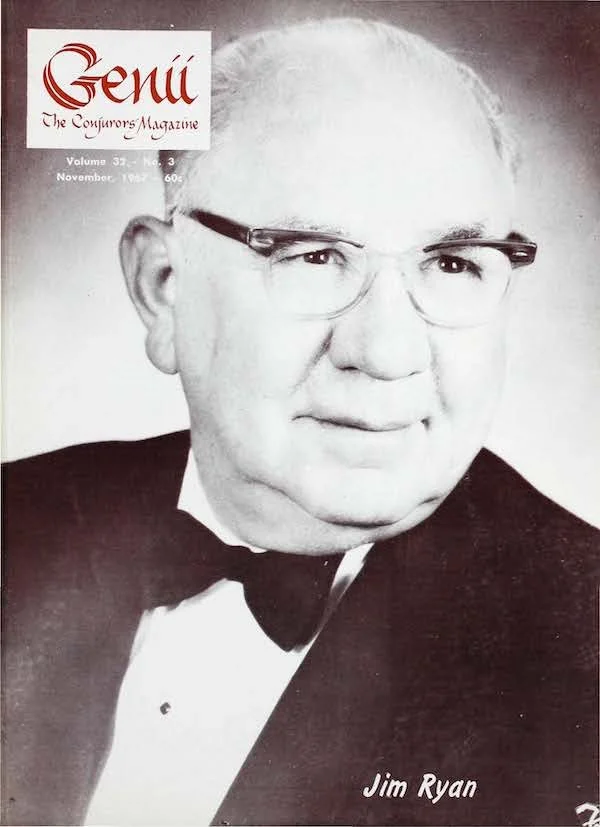Monday Mailbag #57
/[Do you] recommend a technique for easing ones nerves...
My best trick for this is to address the issue to the people before you - "gosh my nerves are kicking in here - hopefully you won't notice my icy, shaking, sweat drenched hand things..." —GB
I tried to address this in a previous mailbag post, but I don’t really have a great answer, because it’s not really something I deal with. At least not regularly.
But here’s an idea to consider. You wouldn’t be able to do it all the time, but you might be able to get away with it occasionally. And that idea is to attribute the nerves to something else. Something related to the trick, but not just, “I’m worried I’m going to screw this trick up.”
So, for example, you could say, “I might be a little jittery here. To do this trick right you have to practice this mind-centering, breathing/meditation technique. It makes you hyper-sensitive to certain things, but it also kind of puts you on edge.”
Or, “Okay, I’m nervous, so forgive me if my hands shake a little. The truth is, I’m not supposed to be showing anyone this trick. I belong to this kind of underground magic group that shares tricks with each other, but we’re not really supposed to show them to others without permission. We sign an agreement and you can get kicked out of the group if they found out. Not that I think you guys would ever say anything to anyone or post anything online. But there are stories of some members of the group performing a trick they weren’t supposed to for someone in their private home when nobody else was around, and nobody mentioned it afterwards, and still somehow this group knew. So that’s why I’m a little on edge. But I really want to show you this thing that I don’t think anyone outside of this group of magicians has ever seen…”
I can think of three benefits to this:
First, it would give you an excuse to show nerves other than, “I’m a little puss-baby who is worried about fucking up his magic trick.”
Second, now that you’ve provided a reason to be nervous, you’ll probably be less so. I would guess that part of the reason people get nervous is because they’re worried about getting nervous.
Third, if you do end up shaking, or sweating like a maniac, or shitting your undies, or whatever, you will have taken this potentially embarrassing situation and turned it around in the audience’s mind. They will think, “Oh, come on… he’s not really nervous, right? It’s just for the story. There’s not really a secret magic organization that’s going to find out about this that he’s worried about, right?”
Hi Andy, after reading today's post (which even made me marvel just reading the coin vanish part... That alone was magical after the setup, even in print) it reminded me I wanted to ask you about breaking character.
Obviously they know this didn't really happen (or any of these stories used in your style a lot). So do you ever just give a knowing smile or a wink at some point?
I ask, because if I did this, they would say, "okay, that didn't really happen, right??", whether it was this story, or one of the many examples you have in print using a setup (even if it was more believable or something that could be true, even if only constructed as back story). What they're really asking, is, "yeah I know there's no curse, but how did you do that?"
They'd know I'm telling tales. That means if I really meant to pull it off, it could never be revealed to look anything but spontaneous if you're doing magic that "comes up" situationally, or because you steer it in that direction to perform.
If you ever break character, then it's, "okay, he's just being the magician/mind-reader that he is".
I know that you know your friends know you are a performer/casual magician (or whatever), so do you just maintain the stories you create and stand by them? Or do you ever acknowledge that they know you're just "putting them on" so to speak?
Hard to explain, but I'm sure you know what I'm asking?
Strict example using this post, if I started that up, they would know I'm going into "that mode". It would still be fun and very engaging because that's a fantastic presentation, but I only know one person dumb enough to believe it, and that that's why the coin vanished. And I don't hang out with her.
Anyway, thoughts? Do you step into character/story mode, like a movie, where everyone then let's go of any prior beliefs and just enjoys the narrative? —NS
I’ll answer this in pieces…
So do you ever just give a knowing smile or a wink at some point?
No. Ideally I’m doing something so impossible/crazy/absurd that it would be kind of insulting to wink at them.
Imagine you’re dating someone and it’s Christmas and you sneak a gift onto the coffee table at some point in time. “Whoa… there’s a gift here on the table. It’s from Santa! Wow. I thought I saw something in the sky earlier.” Or whatever. You wouldn’t then say, “Just so you know, I’m only kidding around.” It goes without saying what’s going on.
Now, I don’t always get this right. I don’t always push things far enough. I made that mistake a couple times last month when I was doing some seance-y type stuff. It was almost too believable for the people I was doing it for (people who are open to that sort of thing). So when I found them more in a state of questioning (“is this real or not?”) rather than appreciation for the story, then I did need to give a metaphorical wink.
But usually I want to do something so outlandish that the wink is redundant. This is the idea of the Reverse Disclaimer. The “wink” or the “knowing smile” in this case is the same as the disclaimer. It’s something I want to get rid of.
I ask, because if I did this, they would say, "okay, that didn't really happen, right??", whether it was this story, or one of the many examples you have in print using a setup
If someone said, “That didn’t really happen, right?” I would say, “I swear to god it did. A gypsy put a curse on this ring and made it take my money. I swear on the lives of your children that’s a true story. Why would you doubt that?”
I know that you know your friends know you are a performer/casual magician (or whatever), so do you just maintain the stories you create and stand by them? Or do you ever acknowledge that they know you're just "putting them on" so to speak?
I will talk with them in a general sense about doing magic, or something I did for a mutual friend. And they will say things to me where they mention really enjoying a particular trick or story. And I’m not like, “No, no! It’s not a trick, it really happened!” So I’ll happily acknowledge the reality in a broad manner. And when you do that, you don’t have to worry about how they view individual tricks.
It’s like professional wrestling. In the 80s, they used to sort of pretend what they were doing was real in and out of the ring. Then, at some point, they realized that was stupid and they went to a model where they would just pretend things were real within the show. But when they appeared on talk shows or podcasts or something, they would talk more freely about playing a character and working on a story arc and whatnot.
The difference between wrestling and magic is that in magic there is less of a distinction between when we’re “in the show” and when we’re not. I intentionally like to blur those lines when I perform. But I’ve educated the people I perform for enough to understand that the performance world is fictional and then there is the real world. What I’m interested in doing is not making it 100% clear when you’re in which world.
So do I step into performance mode? Yes and no. Sometimes I make it very subtle and sometimes it’s more abrupt. The Campfire Story Performance Style, as described in the post you’re talking about in your question, would be on the more abrupt end. It would have a “gather around for this story” feel. But in other cases the people wouldn’t know they were “in” a trick until the climax. Playing around with this sort of thing keeps it interesting for me and the spectators.













